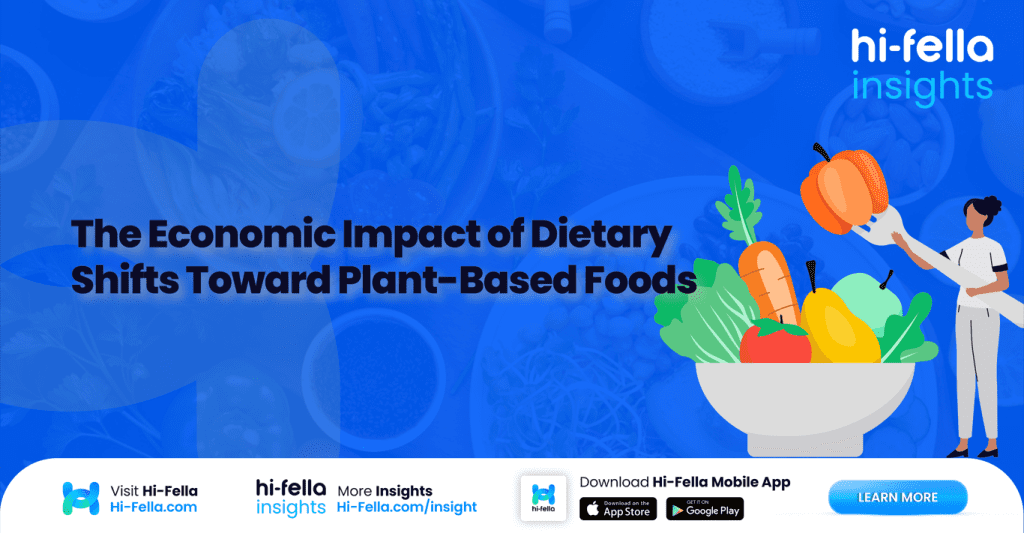What we eat doesn’t just shape our health—it shapes the economy. In recent years, a global shift toward plant-based diets has gained serious momentum, driven by a mix of health consciousness, environmental awareness, and ethical concerns. But beyond personal choices and viral recipe trends, this shift is having profound economic ripple effects across agriculture, food manufacturing, retail, and international trade.
Understanding how this dietary transformation plays out in economic terms helps food businesses, exporters, and policymakers make smarter decisions. Let’s unpack the real numbers, market shifts, and opportunities behind the plant-based boom.
Changing Consumer Demand and Its Economic Signals
What used to be a niche trend among health food stores and vegan cafes is now a global consumer shift—and it’s changing the economics of food in real time. The rise of plant-based eating is no longer limited to vegetarians or vegans. Instead, it’s being driven by a much broader group: flexitarians—consumers who actively reduce their intake of animal products without eliminating them entirely.
This is important economically because it widens the addressable market significantly. The shift isn’t driven only by ideology anymore—it’s driven by health trends, sustainability concerns, and taste innovation. And as this new consumer behaviour spreads across income groups and geographies, it’s generating powerful demand signals that the food industry can’t ignore.
In numbers: the global plant-based food market was valued at approximately $40 billion in 2021, and it’s projected to surpass $75 billion by 2028, according to multiple industry analysts. That’s a compound annual growth rate (CAGR) that outpaces the broader food and beverage sector. While traditional meat and dairy categories grow at 1–3% annually in mature markets, plant-based categories are growing at 10–15%, with some niche sub-segments (like plant-based seafood or alternative cheeses) expanding even faster.
This demand-side shift doesn’t just change what’s in shopping baskets—it redirects capital, innovation, and infrastructure. Investors are increasingly drawn to the space, betting on startups that develop novel proteins, scalable dairy alternatives, or high-fibre meat analogues. Major players like Beyond Meat, Oatly, and NotCo are not just consumer brands—they’re also tech firms, developing proprietary processes, supply chains, and IP portfolios around plant-based production.
Retailers and foodservice providers are responding, too. Supermarkets are dedicating more shelf space to plant-based goods, sometimes integrating them into the mainstream meat and dairy aisles instead of isolating them in “health food” sections. Fast food chains now offer plant-based versions of flagship menu items, responding to consumer demand for familiar formats made with different ingredients.
The shift is also visible in how product diversity has evolved. No longer is plant-based eating confined to tofu, lentils, or veggie patties. Instead, innovation is happening in every direction:
- Pea protein sausages that match the taste and texture of pork
- Jackfruit pulled “meat” that mimics shredded chicken or BBQ pork
- Chickpea milk, almond yogurt, cashew cheese, and oat milk lattes that rival their dairy counterparts in flavour and mouthfeel
- Mushroom-based jerky, seaweed snacks, and protein-rich insects (in some markets) expanding what plant-based even means
What we’re seeing is a redefinition of product categories. The consumer isn’t just choosing “plant-based” for what it excludes (meat, dairy, eggs), but for what it offers: flavour, health benefits, sustainability, and novelty. This shift in consumer perception turns plant-based into a value-driven category, not a compromise.
From an economic standpoint, this creates an inversion of pricing dynamics. In the past, plant-based products were often seen as inferior substitutes and priced lower. Today, they can command a premium—especially when positioned around clean labels, organic ingredients, or eco-packaging. That creates higher margins and faster inventory turnover for manufacturers and retailers alike.
So while this shift in dietary behaviour started as a personal or ethical choice, it’s now a market force—reshaping product development, investment patterns, supply chains, and pricing models across the entire food ecosystem.
And for suppliers, exporters, or innovators looking to ride this wave, the right positioning, partners, and platforms (like hi-fella) will be key to accessing new buyers, scaling distribution, and navigating the growing global demand for plant-powered foods.
Impact on Agriculture and Supply Chains
When diets shift, agricultural priorities shift with them. Traditional livestock farming relies heavily on feed crops (like soy and corn), large land areas, and significant water and energy inputs. A dietary shift toward plant-based foods can reduce demand for livestock and redirect land use toward direct-to-human food crops such as legumes, grains, nuts, and specialty vegetables.
This change in agricultural demand reshapes what gets planted, how land is used, and which regions become key players. For example, countries that specialise in pulses, soybeans, or oilseeds used for plant-based formulations may gain new export relevance. Meanwhile, regions heavily dependent on animal agriculture may face transitional challenges, especially where employment is tied closely to livestock supply chains.
However, the transition can also open up new revenue streams. Plant-based supply chains tend to favour decentralised, small-to-mid-scale growers—making room for regenerative agriculture, vertical farms, and ag-tech integrations that benefit diversified farming operations.
Shifting Retail and Manufacturing Economics
From an industry standpoint, the shift toward plant-based consumption is prompting structural change in food processing and retail. Legacy food manufacturers are adapting product lines to include plant-based SKUs. Major retailers are devoting more shelf space to plant-based sections. And foodservice giants—like fast-food chains and institutional caterers—are revising menus to reflect plant-forward demand.
This shift often comes with cost and margin considerations. Plant-based products can carry premium pricing due to R&D investments, specialised ingredients, or marketing—but as economies of scale kick in, prices are beginning to fall. For producers, this means lower per-unit cost over time as demand stabilises and supply chains become more efficient.
The result? A growing incentive for more players to enter the plant-based market. The economic ecosystem around these products—raw material suppliers, flavour houses, extrusion equipment makers, cold chain providers—is expanding rapidly. It’s not just a product category anymore—it’s an entire industry vertical.
Trade and Export Implications
As plant-based foods go global, export dynamics are shifting, too. Countries that produce soy, chickpeas, quinoa, or oats are seeing surging demand from manufacturers looking to secure clean-label, non-GMO, or organic inputs. Southeast Asia, Latin America, and Eastern Europe are emerging as sourcing hubs for raw materials feeding the plant-based boom.
At the same time, exporters of finished plant-based goods—especially snacks, beverages, and frozen meals—are finding new market access opportunities, particularly in health-conscious or climate-conscious regions like the EU, UAE, and parts of Asia-Pacific.
Regulatory frameworks, of course, play a key role. Labelling laws around “milk,” “meat,” or “cheese” analogues are still evolving. Tariff structures may vary between plant-based and animal-based products. But overall, the international trade environment is becoming more open and favourable to plant-forward products, particularly those tied to sustainability, traceability, and clean ingredients.
Labour and Employment Shifts
Dietary shifts also affect the labour economy. As demand for traditional animal farming declines, so too does employment in those segments—unless transitions are actively supported. However, new jobs are being created in alternative protein R&D, plant-based product manufacturing, and climate-smart agriculture.
This reallocation of labour isn’t necessarily negative—it’s a re-skilling opportunity. Governments and food conglomerates that invest in training, certification, and innovation ecosystems around plant-based production will not only create future jobs—they’ll reduce dependency on increasingly volatile global meat and dairy markets.
Environmental Cost Savings as Economic Advantage
Let’s not forget the cost of inaction. Animal agriculture contributes a significant portion of greenhouse gas emissions, water usage, and land degradation. As climate change drives policy, companies with heavy livestock footprints are seeing rising operational costs—from carbon taxes to water use fees to reputational risk in ESG evaluations.
Shifting toward plant-based production isn’t just environmentally responsible—it’s economically defensive. Businesses that lower their environmental footprint gain better access to financing, partnerships, and preferential treatment in sustainable trade agreements. In short: cleaner products often unlock cleaner margins.
Seizing the Opportunity with Smart Platforms
As plant-based products continue gaining traction, businesses across the food industry—from suppliers and manufacturers to exporters—need access to smarter networks, strategic partners, and export-ready platforms that support rapid scale.
This is where hi-fella comes in. Whether you’re producing shelf-stable vegan snacks, sourcing climate-resilient ingredients, or preparing to exhibit plant-based innovations at international food expos, hi-fella connects you to the ecosystem you need to grow.
With curated trade leads, market insights, and global exhibition access, hi-fella helps plant-based players gain visibility, find buyers, and stay ahead in a market where dietary change is driving economic change.
Final Thought: It’s Not Just a Trend—It’s a Transformation
The move toward plant-based foods isn’t just about lifestyle—it’s about economics. It’s reshaping what gets grown, how products are made, where value is created, and who wins in the global food trade.
Whether you’re adapting your supply chain, rethinking your export plan, or developing the next great plant-based product, success lies in understanding this shift as both a consumer movement and an economic opportunity.
And when you’re ready to turn that opportunity into scalable growth—hi-fella is here to help you move, connect, and lead the change.








